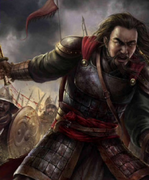- "A dark tide rises to the east – an army of such size and power that all the land is made quick to worry. Their leader is a man named Temujin, who has adopted the title Genghis Khan. He sweeps across the lands, conquering and subsuming all who stand in his way."
- ―Altaïr Ibn-La'Ahad's Codex, page 29.[src]
Genghis Khan (ᠴᠢᠩᠭᠢᠰ ᠬᠠᠭᠠᠨ; c. 1162 – 1227), born Temüjin (ᠲᠡᠮᠦᠵᠢᠨ), was the founder and first Great Khan of the Mongol Empire, which he ruled from 1206 until his death.
Utilizing a Sword of Eden, Genghis Khan established what would later become the largest contiguous empire in history.[2]
Biography[]
Early life[]
Temüjin was born circa 1162 in the Khentii Mountains within the territories of the Khamag Mongol, to Yesügei a chieftain of the Borjigin clan and his principal wife Hö'elün from the Olkhonud clan.[3]
Rise to power[]
At a later point in his life, Temüjin obtained a Sword of Eden,[2] and used its abilities to eventually found the Mongol Empire in 1206 and ruled it as Genghis Khan.[3]
By the year 1217, the Mentor of the Levantine Brotherhood of Assassins, Altaïr Ibn-La'Ahad, correctly suspected that Genghis Khan's rise to power was due in part to a Sword of Eden. Thus, Altaïr, his wife Maria, and his son Darim traveled to Mongolia intending to assassinate Khan and retrieve the Piece of Eden.[4]
By 1221, following a two year invasion,[3] Genghis Khan had control of the Silk Road trade route, bringing it under one cohesive political environment.[1]
Death[]

Genghis Khan's last moments
In August 1227, Altaïr and his allies located Genghis Khan in Xingqing around the time his Mongol forces were besieging the city; the Mongolian Assassin Qulan Gal shot Genghis Khan's horse with an arrow, dismounting the Mongol Emperor and providing Darim the chance to kill him[5] with a crossbow bolt.[6]
Legacy[]
Genghis Khan's grandson, Hülegü Khan, later destroyed most of the Assassin strongholds in the Levant after a failed attempt on his life in 1256, effectively erasing the Levantine Assassins' power.[7]
After his death, a literary work on Genghis Khan and his family was written. A copy of the work was later purchased by Ezio Auditore in Constantinople in the 16th century.[8]
In 2016, Rebecca Crane estimated that Genghis Khan likely had sixteen million living descendants.[9]
Gallery[]
Appearances[]
- Assassin's Creed II (first mentioned)
- Assassin's Creed: The Secret Crusade (mentioned only)
- Assassin's Creed: Revelations (mentioned only)
- Assassin's Creed: Initiates (mentioned only)
- Assassin's Creed IV: Black Flag (mentioned only)
- Assassin's Creed: Memories (first appearance)
- Assassin's Creed: Last Descendants – Tomb of the Khan (mentioned only)
- Assassin's Creed film (appears in promotional material only)
- Assassin's Creed: Reflections
- Echoes of History (mentioned only)
References[]
- ↑ 1.0 1.1 Who's In Your Blood?
- ↑ 2.0 2.1 Assassin's Creed: Memories
- ↑ 3.0 3.1 3.2
Genghis Khan on Wikipedia
- ↑ Assassin's Creed: The Secret Crusade – Chapter 48
- ↑ Assassin's Creed: The Secret Crusade – Chapter 50
- ↑ Assassin's Creed: Reflections – Issue #02
- ↑ Assassin's Creed Encyclopedia
- ↑ Assassin's Creed: Revelations
- ↑ Assassin's Creed: Last Descendants – Tomb of the Khan – Chapter 6
| |||||||||||||||||||||||||



